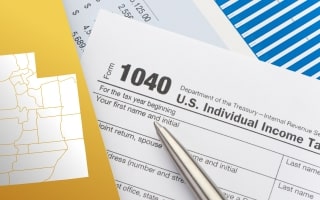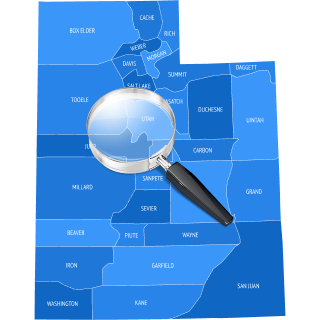Property Tax Records in Utah

If you're investing in a rental building or buying a single-family home, you'll receive a property tax bill every year. This bill will be divided into 12 equal amounts that you'll pay with your monthly mortgage payments. In Utah, property taxes are used by the counties to pay for public services.
While the effective tax rate can differ between counties, the state's average is just 0.52%. The national average is 0.99%, which means that Utah has some of the lowest property taxes in the United States.
Several elements determine property taxes in Utah, which include the tax rate, the county budget, and your home's taxable value. If your home's value increases, your tax bill will likely go up. The tax rate for the year depends on the county budget. Understanding these factors can help homeowners better anticipate and manage their property tax expenses.
Property taxes can only be calculated once your home is appraised by the county assessor. By identifying the market value of your home, it's possible to determine the assessed value, which is what the tax rate is applied to. You should receive your annual tax bill by the end of October every year. These taxes are due by November 30.
Utah has collected taxes on all tangible property since it received statehood in 1896. This form of taxation is enshrined in the state's original constitution. For nearly 50 years, the assessed value of a home matched its market value. In 1944, the assessed value was reduced to just 40% of the market value. Further reductions took place in the following decades. However, the assessment value returned to 100% of the market value in 1986.
Property Tax Assessment in Utah

In Utah, property taxes are managed by each county. Once the county assessor appraises your property, they'll be able to calculate your taxes. Some of this process is based on guidelines that the state has issued to ensure property taxes remain consistent across the state. However, counties must calculate tax rates on their own.
The initial stage of the property tax system in Utah involves identifying the values of each property. County assessors must visit each property in person once every five years. During this process, the assessor will identify your home's current market value. While appraisals only take place once every five years, your annual property taxes can still change each year based on everything from sales data to current market conditions.
The property taxes you pay every year are based on the rates in each tax district throughout your county. There are over 1,000 tax districts in Utah, which is why some counties have higher rates than others. Keep in mind that school districts, water districts, and cities can levy property taxes. Once the rates for each taxing district in your county are combined, your property taxes can be estimated.
Before property tax exemptions in Utah and deductions are applied, your home's assessment value will be the same as its market value. Let's say that your home has a market value of $240,000. If you live in a county with an effective tax rate of 0.51%, your annual property taxes will be $1,224. The tax rates for the most populous Utah counties are:
- Salt Lake County: 0.75%
- Utah County: 0.59%
- Davis County: 0.72%
- Weber County: 0.87%
- Washington County: 0.61%
Salt Lake County property taxes are impressively low, especially when considering that it's the most populated county and home to the world-famous Salt Lake City. However, if you want to pay low property taxes in Utah, check out Utah County and Washington County, although the difference isn't that much.
Calculate Utah Taxes
It is wise to use a Utah property tax calculator to gain a clearer understanding of how property taxes are calculated in the state. This tool simplifies the process for both homeowners and real estate investors by allowing users to input key property details, such as location, assessed value, and property type, to estimate their annual tax assessment and liability.
A Utah property tax calculator can also help determine eligibility for exemptions and relief programs. The state offers tax relief options such as the Circuit Breaker program, which provides tax abatements to low-income seniors and disabled homeowners, and veterans exemptions for disabled service members or their surviving spouses. Using the calculator helps homeowners estimate these potential savings, offering a more complete view of their annual property tax obligations and opportunities for relief.
using our property tax calculator.
Utah Property Tax Records: What Are They?

Once your property taxes are collected by the county, they'll be used to fund numerous government services. Since these taxes provide counties with a reliable funding method, they typically use the money to pay for school districts, utilities, fire protection, and other services.
Once you become interested in a property, it's highly recommended that you do ample research on the home to ensure you make a sound investment. While there are several sources you can access to obtain info about a property, the best option involves searching for the home's tax records.
These records are designed to collate many different pieces of information about a property. For example, you can learn about a home's assessed value, condition, property taxes, and renovations once you find the documents you're looking for.
Every county in Utah maintains an online database that allows the public to search for tax records. While each database differs somewhat, you can usually search with parameters like owner name, parcel ID, address, year built, or property type. The information that's collected in property tax records includes the following:
-
Property tax info for the past four years
-
Legal description
-
Owner name
-
Address
-
Square footage
-
Total acreage
-
Market value
-
Tax district
-
Property type
-
Value history for the past three years
-
Lot type
-
Topography
-
Traffic
-
Roofing type
-
Number of rooms
-
Year built
-
Condition of exterior and interior
-
Building sketch
-
Interactive parcel map
-
Recent photo
-
Neighborhood values
Property Tax Exemptions and Deductions in Utah

Unlike most states, Utah offers a homestead tax exemption to nearly every owner of real estate. There are, however, several requirements you'll need to meet if you wish to qualify. Homeowners also have access to several additional property tax exemptions in Utah. Here's a look at a few of them:
Primary Residential Exemption: The Primary Residential Exemption is available to most homeowners in Utah. It exempts 45% of a home's fair market value. This exemption also covers one acre of land.
To qualify, the property must be your primary residence. The valuation notice you receive should inform you if you qualify for the exemption. Once the exemption is applied, your property will be taxed based on 55% of its market value.
Disabled Veteran Exemption: If you have a disability that has a rating of 10% or higher, you'll qualify for this exemption. However, the amount you qualify for depends on the percentage of your disability. The maximum benefit for 2024 is just over $500,000.
Active-Duty Service Member Exemption: If you've completed more than 200 active days of deployment during the year, you can request this exemption. If you qualify, it will eliminate your property taxes for the year.
Exemption for the Blind: This exemption is available to homeowners in Utah who have been declared legally blind by an ophthalmologist. It exempts the first $11,500 of your home's taxable value.
How To Search Property Tax Records in Utah

You can find property tax records for any home you're interested in by accessing the county records or using a third-party tool. While there are many third-party sources on the market, your best option is PropertyChecker. If you choose to search for tax records with your county's online database, you should be able to find it on the assessor's website.
As for PropertyChecker, it's a fast and seamless website that allows the public to gain access to tax records with a single search. Once you enter a property address, owner name, email address, parcel ID, or phone number, you'll receive a report with the information that matches your property. The report should include the following details:
-
Owner names and mailing addresses
-
Loan records, which include terms, rates, and lender info
-
Property deed records
-
Sales history, which includes transfer type and dates
-
Neighborhood info, including school ratings, demographics, and crime statistics
-
Property details like lot location and square footage
-
Historical and current property values
-
Property tax records
-
Lien records, which include amount and status
-
Building permit details
-
Foreclosure records
How To Appeal Property Taxes in Utah

Once you buy a home in Utah, the assessor in your county will visit the property once every five years to estimate its current market value. However, the value of your home can still be updated in the interim. If your property value changes from one year to the next, you'll receive a notification by mail. Valuation notices are typically sent in July, well before your taxes are due.
If you identify an error in the valuation notice, you can attempt to correct the problem by filing an appeal. If you're able to prove that the current market value is inaccurate, you can reduce your property taxes. However, this process can involve multiple appeals. Follow this step-by-step guide to appeal your property taxes.
Step 1: Once you receive a valuation notice in the mail, you can choose to appeal your property's taxable value. The appeal must be filed with your county's Board of Equalization. After you submit this appeal, you'll be notified of the hearing date. During this hearing, you must provide the Board with any evidence that indicates the assessor made a mistake. The assessor will also provide their evidence.
Step 2: You may not agree with the Board's decision. If you want to appeal it, you'll need to do so within 30 days. These appeals must be filed with the Tax Commission Appeals Unit. You'll then receive a notice of the scheduled hearing, which is held before a tax commissioner or administrative law judge. You can take part in the hearing by phone or in person.
Step 3: The Tax Commission Appeals Unit may schedule a Mediation Conference. However, you can opt out of this process, which means that your case will progress to a formal hearing. If you can agree with the county assessor during mediation, the Tax Commission will support it.
How Property Tax Records Impact Real Estate Transactions in Utah

When you buy, sell, or invest in a Utah home, there's a good chance that property tax records will impact the transaction. While most counties in Utah have low property tax rates, this isn't the case with every location. For example, San Juan County has an effective tax rate of 1.02%. If the home you're interested in buying has a market value of around $300,000, your annual property taxes could be north of $3,000. Therefore, it's essential to factor in these potential costs when evaluating your overall budget for a new home.
Buyers are required to estimate how much their monthly payments will increase once property taxes are applied. These estimates can be the difference between going through with a transaction and backing out because the monthly payments are too high. A seller can also encounter problems during a transaction if their property taxes are too high. The potential buyer may ask for concessions or request that the seller cover the first year's property taxes.
If you're investing in a home, these taxes are important when weighing the viability of an investment. If property taxes increase your monthly payments by $250, you'll need to charge a high enough rental price to ensure the money you bring in is more than the amount you spend every month.
Investors can also take advantage of property tax sales in Utah. If a homeowner doesn't pay their property tax bill in full by the end of November, their taxes will become delinquent on the first day of December. Once this occurs, the city can place a lien on the property for the outstanding taxes that the homeowner owes. This lien usually becomes official on January 1.
Even though the county will place a lien on your property if you fail to pay taxes, a tax lien certificate won't be sold to investors. Instead, the county will hold onto the lien for four years. During this time, penalties and interest will increase. The homeowner has four years to pay the outstanding taxes and any interest that has built up. If they fail to do so, the property can be sold in a tax sale.
Most counties hold property tax sales in May or June. The winning bidder will receive the deed to the property after they pay all remaining taxes and interest. This process can offer a unique opportunity for investors, but it's important to thoroughly research the property and its history before bidding.
Free Utah Property Tax Lookup
Tax Records Please wait...
Property Tax Guide
Instant Access to Utah Property Records
- Owner(s)
- Deed Records
- Loans & Liens
- Values
- Taxes
- Building Permits
- Purchase History
- Property Details
- And More!
Free Utah Property Tax Lookup
Tax Records Please wait...